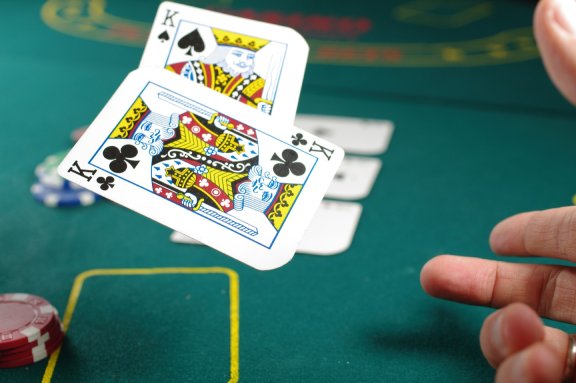Despite being a game with a lot of luck involved, poker is similar to chess. Both games are quite easy to learn, but in order to become a winning poker or chess player, you have to put a lot of work into your game. That may sound discouraging at the start of your poker adventure, but there is also a silver lining: you do not have to be the best poker player out there, you just have to be better than your opponents.
Even though the average poker player getting better over the years, people playing in low/mid stakes games (both live and online) make many mistakes that you can exploit to boost your win rate. In this article, we will give you a few poker tips that will help you conquer nearby Texas Holdem games – especially live ones.
Poker tip #1 – Quality over quantity
At your average Texas Holdem poker table, you will face between 6 and 9 opponents. Whether we’re considering live games or online poker, people at low to mid stakes tend to be quite sticky and do not like to fold. How can you take advantage of that?
By playing a solid range of hands and by playing them aggressively. In most situations, especially live, you will be able to take your time and pick your spots carefully. Develop a solid base range of hands you play and stick to it. Pocket pairs, suited aces, broadway hands, and best suited connectors constitute about 25% of all starting hands, and that’s a good entry point to further developing your strategy.
While you play against your average not-so-skilled opponents, a solid preflop strategy will allow you to put a lot of pressure after the flop, exploiting the broad ranges of your competition. If you want to maximize your profits against a soft field, play tight but aggressively, get value from your strong hands, and throw in occasional bluffs.
Poker tip #2 – Defend the big blind properly
The big blind is the worst position to be in Texas Holdem. You have to put your chips into the middle every few hands without even seeing your hole cards. You’ll get dealt pretty bad hands most of the time, which can be tricky to play.

Generally speaking, you can play a lot of hands from the big blind profitably (and by profitably, we mean that you do better off playing them than just folding). However, you have to keep a few things in mind.
Consider the number of players in the pot
The more players have already put money into the pot, the more selectively you have to play. If the pot is going to be multiway, lean towards playing hands that do well in multiway pots, like suited aces, kings or queens, pocket pairs, and suited connectors.
For example: when there is only one raiser, and the action reaches you, most of the time, you can pretty much defend with any two suited cards. When there is a raise and three calls, the value of worse hands, e.g. 84s, goes down drastically, and most of the time, it would be almost impossible to play such a hand profitably.
Consider the position of the original raiser
The earlier the position of the original raiser is, the more cautious you should be. While top pair with no kicker is a pretty strong holding against an opponent on the button, it will put you in a lot of trouble against a UTG open. Be very careful against early position opponents representing a lot of strength.
Consider the size of a raise
Nowadays, most people raise between 2 to 4BB in most online and live poker circumstances. Picture such a situation: you are at the live poker table, and the older gentleman open raises with a 10 big blind bet. As much as it would be tempting to outplay him with 86o, you got dealt on a big blind, we’ll advise you against calling (unless you both are extremely deep).
Usually, a big raise preflop signals a strong hand, especially in a live poker game. This should sound the alarm and lean you towards playing only hands that flop well, like pocket pairs, suited broadways, and connectors. Calling with marginal holdings will often put you in gross spots, in which you caught a small piece of a board but face awkwardly big bets.

Poker tip #3 – avoid (open) limping
Limping (that is, putting chips equal to the big blind into the pot) is the cheapest way of seeing a flop in Texas Holdem. Unless you are in the small blind or someone else has already limped (in which case your action would be called an overlimp), you should avoid limping.
The most important factors you have to keep in mind preflop are:
You want to play primarily strong hands
Having one validates creating bigger pots, i.e. raising. If you open limp, you are decreasing the potential size of a pot significantly. Moreover, you are letting other players see the flop cheaply and even for free in case of a big blind, which also lowers the possibility that you’ll win the pot later on.
Limping does not allow you to take the pot down before the flop
Winning 2 big blind pots may not seem like much, but these small pots add up and are an important part of your overall win rate.

Poker tip #4 – there’s no shame in folding
Even the best poker players find themselves in very tough situations to navigate. Texas Holdem is a very complex game, and sometimes it’s virtually impossible to choose the correct line of play on the spot.
Generally, the softer the poker game you play is, the less unhappy you should be with folding in tricky spots. Most people playing low to mid stakes poker tend to be too loose and too passive. Of course, you’ll encounter real maniacs from time to time, but they are pretty easy to identify.
Think about it this way: even if you have a pretty strong hand when your passive opponents raise you big on the flop and continue the aggression on further streets, it’s pretty likely that you are beaten. Most players will not bluff frequently enough to justify calling their continuous bets with strong but not very strong hands.
Of course, sometimes you’ll be mistaken and feel silly, but if you find yourself on the river, facing a huge bet from a passive opponent, the chances are that fold is the best option to choose.
Poker tip #5 – choose the right poker games
Today’s last poker tip is most likely the most important one. In poker, the skill is relative to the people you play against. You do not have to be one of the greatest poker players to win money. You just have to be one of the best players at the poker table you’re going to play.
The games you participate in have a tremendous impact on your win rate. If you want to test your skill from time to time, there’s no harm in playing against tougher competition, but your everyday poker game should be one you can beat.

If you have a decent understanding of how to play poker in general, finding the right poker table shouldn’t be that hard. In most casinos lowest limits of cash game tables and low buy-in tournaments are swarmed with recreational players – the same is true (to a certain extent) for the online field.
Just remember that most recreational poker players (especially in a live environment) are there to have fun, so while you may be the best player on the table, don’t necessarily act like one. Don’t preach to others, don’t lecture them after bad plays. Just play along, let others have fun, and enjoy your time.
The right game for you can be Spin & Go’s – check what we can offer you and try for yourself for 30 days without any commitments:
